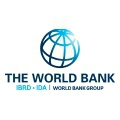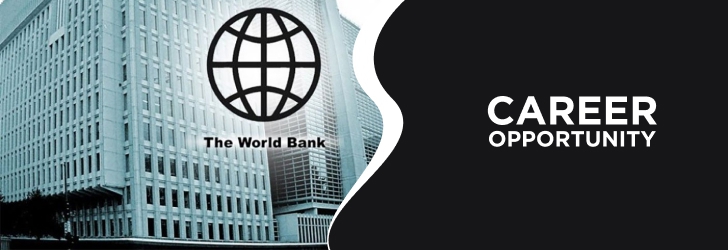


With 189 member countries, staff from more than 170 countries and offices in over 130 locations, the World Bank Group is a unique global partnership: five institutions working for sustainable solutions that reduce poverty and build shared prosperity in developing countries. The World Bank Group is committed to achieving diversity in terms of gender, nationality, culture, and educational background and maintain a diverse, highly qualified, and dedicated workforce.
Views: 2271 | This job is expired 1 year, 4 months ago
Recruitment Type: Local Recruitment
Department/Division: Agriculture and Food PG SAR1 (SSAA1)
Grade: GF
Location: Kathmandu, Nepal
Term Duration: 3 years 0 months
Hire Type: Non-Managerial
Required Language(s): English, Nepali
Do you want to build a career that is truly worthwhile? Working at the World Bank Group provides a unique opportunity for you to help our clients solve their greatest development challenges. The World Bank Group is one of the largest sources of funding and knowledge for developing countries; a unique global partnership of five institutions dedicated to ending extreme poverty, increasing shared prosperity and promoting sustainable development. With 189 member countries and more than 120 offices worldwide, we work with public and private sector partners, investing in groundbreaking projects and using data, research, and technology to develop solutions to the most urgent global challenges. For more information, visit www.worldbank.org
The South Asia Region Context
The South Asia Region comprises eight countries (Afghanistan, Bangladesh, Bhutan, India, Maldives, Nepal, Pakistan, and Sri Lanka) that range in size from India (with a population of over 1 billion) to Maldives (with 0.3 million people). The region has experienced a long period of robust economic growth, averaging 6% a year over the past 20 years. It was the second-fastest growing region in the world in the aftermath of the global crisis. This strong growth has translated into declining poverty and impressive improvements. The percentage of people living below the poverty line fell in South Asia from 56% to 16% between 1981 and 2013. Still, the region remains home to a third of the world’s poorest, with 216 million people living below $1.9/day.
The South Asia Region: https://www.worldbank.org/en/region/sar
Sustainable Development Practice Group
The Sustainable Development (SD) Practice Group (GP) supports the WBG’s twin goals by focusing on sustainable and inclusive growth. It consists of five Global Practices and one Global Theme. The Global Practices (GPs) that belong to the SD PG are: Agriculture and Food; Environment, Natural Resources, and the Blue Economy; Urban, Resilience, and Land; Social Sustainability and Inclusion; and Water. The Climate Change Group forms SD PG’s single Global Theme. In addition, SD is the Bank-wide steward for the Environment and Social Framework (ESF).
SD’s leadership team includes Regional Directors (RDs) responsible for delivery of SD’s regional and country programs, and Global Directors (GDs) who have a primary role in setting GP strategy, global engagements, promoting the flow of global knowledge, talent management and strategic staffing. The SD PG has four objectives: (i) deliver basic needs; (ii) ensure sustainability; (iii) build social inclusion/cohesion; and, (iv) lead on long term issues.
Agricultural development is one of the most powerful tools to end extreme poverty, boost shared prosperity and feed a projected 9.7 billion people by 2050. Visit: https://www.worldbank.org/en/topic/agriculture. The Agriculture and Food Global Practice (GFADR) of the World Bank Group consists of around 260 staff globally, of which about a third are located in country offices. In South Asia Region (SAR), the Agriculture and Food Unit, SSAA2, serves India and Afghanistan. SSAA2 operates as part of the South Asia Region (SAR) Sustainable Development (SD) Practice Group (PG), which helps countries tackle their most complex challenges in the areas of Agriculture and Food, Climate Change, Environment, Natural Resources & Blue Economy, Environmental and Social Framework, Urban, Disaster Risk Management, Resilience & Land, Social Sustainability and Inclusion, and Water. The SSAA2 Agriculture and Food Unit has a large portfolio across the two countries it serves and it includes a range of investments and analytical products supporting food system transformation. In India, this covers over 10 states through central and state-led investments (currently 15 investment projects in the amount of over US$3 billion) and a range of policy and analytical engagements which are addressing reforms, policy development and implementation capacities. The Unit is led by a Practice Manager based in New Delhi and the team consists of over 20 staff, over half of which are based in Country Offices.
The Agriculture and Food GP team in SSAA1 includes staff based mainly in the Colombo, Dhaka and Kathmandu and Washington DC Offices, covering Afghanistan, Bangladesh, Bhutan, Nepal, and Sri Lanka. It is headed by a Practice Manager based in Washington DC. SSAA1 plays the lead role in developing and implementing the World Bank agriculture and rural strategy in these countries, including supervising the pipeline and active portfolio.
Duties & Accountabilities:
We are seeking an Agriculture Economist to support our operational work in the Nepal agriculture, food,and rural transformation portfolio.
The Agricultural Economist will be part of the Nepal Agriculture and Food Team with a primary responsibility to provide implementation support, policy dialogue, technical assistance and knowledge management related to the agriculture program and investments. In particular, the Agricultural Economist will:
Selection Criteria
Competencies:
World Bank Group Core Competencies
The World Bank Group offers comprehensive benefits, including a retirement plan; medical, life and disability insurance; and paid leave, including parental leave, as well as reasonable accommodations for individuals with disabilities.
We are proud to be an equal opportunity and inclusive employer with a dedicated and committed workforce, and do not discriminate based on gender, gender identity, religion, race, ethnicity, sexual orientation, or disability.
Note: If the selected candidate is a current World Bank Group Staff Member with a Regular or Open-Ended appointment, they will retain their Regular or Open-Ended appointment. If the selected candidate is a current World Bank Group Staff Member with a Term appointment that expires later than the end date of this appointment, they will retain the duration of their current Term appointment.
This job has expired.